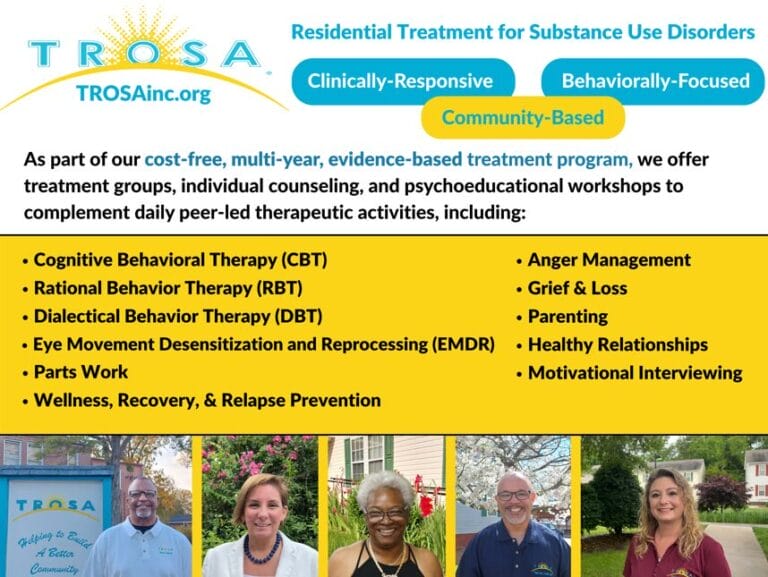TROSA is an award-winning, evidence-based treatment program for individuals with substance use disorders. TROSA uses nationally-recognized best practices and evidence-based skills classes, techniques, and therapies, such as Cognitive Behavioral Therapy (CBT). We offer treatment groups, individual counseling, and psychoeducational workshops that complement ongoing community and peer support.
Licensed and certified treatment professionals provide individual and group counseling, and resident leaders and on-campus Peer Support Specialists provide ongoing daily therapeutic engagement as part of our peer-led community model.
Individual and group counseling and classes offer a range of therapies to help our residents with issues such as depression, anxiety, and trauma. TROSA also provides skills-based classes that empower residents to learn and practice navigating day-to-day challenges they may encounter in recovery.
A partial list of TROSA’s classes, techniques, and therapies include Cognitive Behavioral Therapy (CBT); Rational Behavior Therapy (RBT); Dialectical Behavior Therapy (DBT); Motivational Interviewing; Wellness, Recovery & Relapse Prevention; Parts Work; Anger Management; Healthy Relationships; Grief & Loss, and more.
Clinically-Responsive, Community-Based, and Behaviorally-Focused
TROSA was founded in 1994 and has accumulated awards and recognition as a model treatment program.
“In my experience, TROSA is unparalleled with regard to the range, scope, and scale of its approach to serving those with complex substance use disorders, including those with co-occurring mental health disorders. TROSA is an exemplar of a comprehensive, long-term, evidence-based model for treating substance use disorders. Effectively combining proven community-based and behaviorally-focused methods with clinically responsive therapies, TROSA offers unique opportunities for individuals to achieve and sustain their recovery. The program not only addresses behavioral, social and psychological issues associated with substance use disorders; it also offers tools and resources for its residents to enjoy a better life. As evident in the program’s outcomes, as well as its accumulation of national, state and regional awards and recognitions, TROSA fills a significant gap by specializing in the treatment of highly vulnerable individuals.”
Paul Nagy, LCMHC, LCAS, CCS; Assistant Professor, Duke University School of Medicine; Department of Psychiatry and Behavioral Sciences, Division of Social and Community Psychiatry
Click here to learn more about TROSA’s comprehensive program services.

